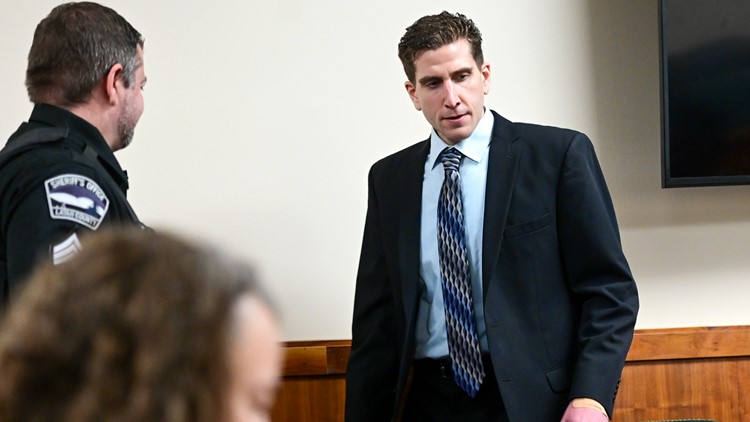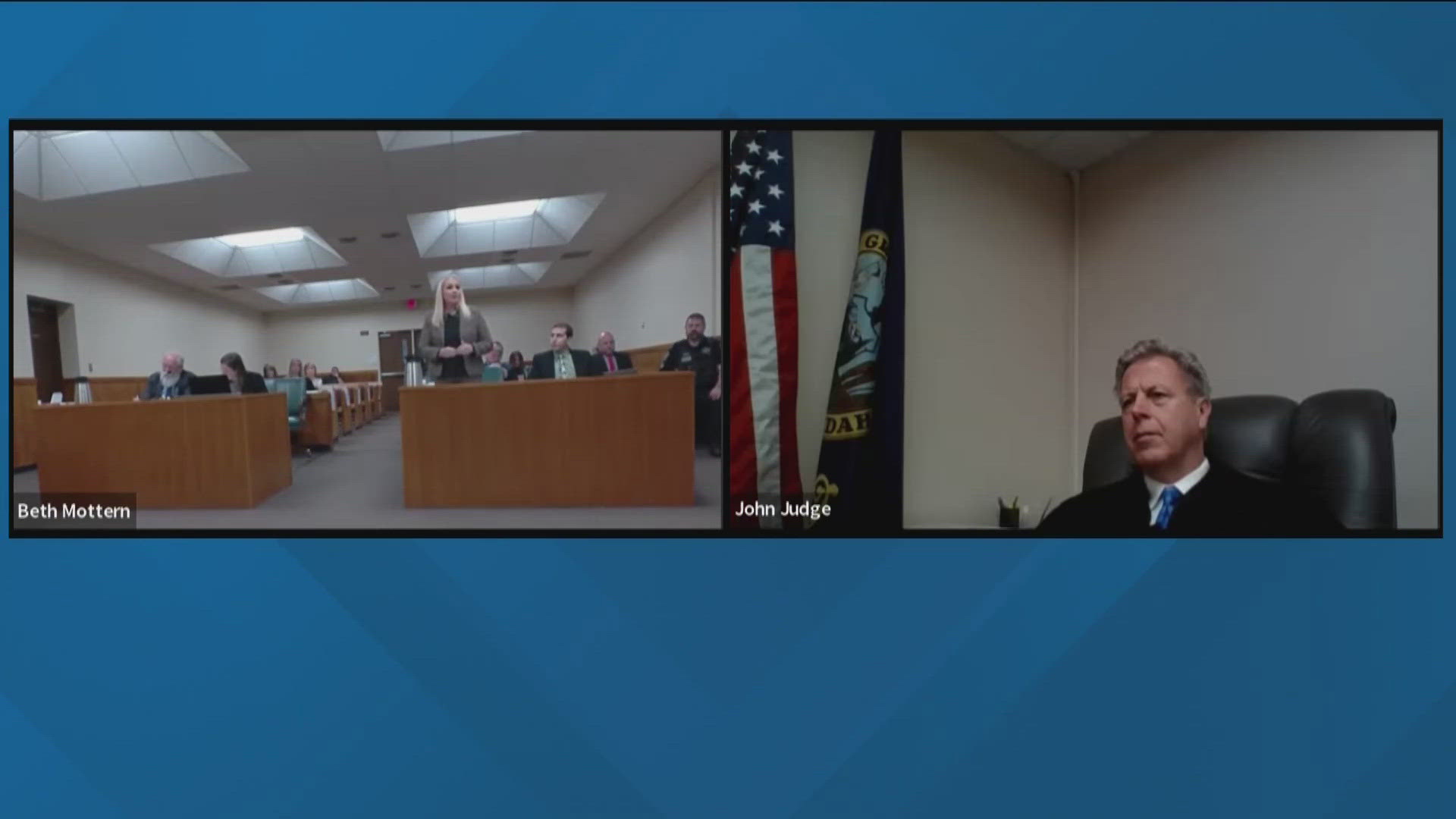MOSCOW, Idaho — The defense team representing the man accused of murdering four University of Idaho students last year told a Latah County judge on Friday that it doesn't matter what the public or the media learns about their client, they will find a way to twist it -- even, hypothetically, if they learn he uses a blue toothbrush.
Bryan Kohberger, 28, is charged with fatally stabbing Xana Kernodle, Madison Mogen, Kaylee Goncalves and Ethan Chapin in a home in Moscow on Nov. 13, 2022. He is expected to go to trial Oct. 2 -- but before then, Latah County District Judge John C. Judge must decide on amending a "gag order" in place to prevent police and attorneys from commenting on the case and whether or not to allow cameras in the courtroom for future proceedings.
The case against Kohberger has garnered national, even worldwide media attention -- so much so, that Jay Logsdon, a litigation attorney who is part of Kohberger's defense team, told the court that it has gotten to the point where he could tell everyone Kohberger uses a blue toothbrush "and it would be prejudicial to him."
Judge had some hefty opinions for the media coalition, represented by prominent Idaho attorney Wendy Olson. The coalition, made up of multiple local and national media outlets, previously filed a motion to vacate the gag order in the case so reporters could provide more accurate information, Olson said. The coalition had an opportunity to argue their position Friday afternoon.
Judge told Olson during her arguments against the gag order that he also believed the media has twisted and manipulated information and pictures about the case, even though he said he doesn't watch very much news content.
“There is a lot of misinformation and disinformation out there that is concerning," Judge said.
The only reporters Judge praised were the local reporters in the area, who he said were usually fair and balanced when reporting on the judicial process. But, the national media has a history of sensationalizing the case, he said.
"There was a lot of speculation, criticism, bad information... That would trigger for any lawyer to try to protect the integrity of the investigation and the future court process," Judge said. He must weigh the First Amendment, the right to free speech, against the Sixth Amendment, the right to a fair trial. It's a balance, he said.
Olson somewhat agreed, but only because the gag order was in place, she said. If reporters were able to get the truth from attorneys and law enforcement about the judicial process, it would give way to more accurate, less sensationalized reporting on the matter and the ins and outs of the court system, she told Judge.
"When (reporters) function well, they get information out there that is truthful and accurate," Olson said. "No one is expecting the attorneys are going to run out and tell you everything they know about the case. They’re not."
Olson argued that the media who is a part of the coalition only want their reporters to obtain accurate information, and if the judge were to somehow amend the gag order, she would want it to be as narrow as possible so journalists would have some type of ability to clarify any questions they may have about the judicial process.
Olson was also able to argue the media's stance on cameras in the courtroom -- so far, the defense has objected to this, saying social media has run rampant with speculation analyzing Kohberger's body language and therefore creating possible trial prejudice.
Olson told the court that cameras are necessary within the trial and other hearings because the public, and the family of the victims, have a right to observe the proceedings.
"(Cameras) provide an opportunity to educate the public on how the courts work... If you're trying the case in the courtroom, the public can learn a lot about how the case proceeds… Make decisions for themselves," Olson said.
The defense had a different idea. Jay Logsdon, a litigation attorney with Kohberger's defense, said in regards to the gag order that the only way to comment or air-out any issues is within a courtroom.
"The media is not a good place to do this. The media of 2023 is not a good place to go when trying to resolve issues," Logsdon said.
He told the court that the media has already decided Kohberger is "their guy" and is wondering "how long until (they) can get him in front of a firing squad.”
“The reality is if they spoke to us, they will pick and choose from our statements, they will twist what we said… They will continue to put on the same narrative that gives them clicks," Logsdon said.
He also mentioned how this may be a potential death penalty case, and given the publicity, the defense's concerns don't stop even after a conviction is issued.
Olson expressed the same sentiment, saying she understands the defense has an interest in fighting for Kohberger's freedom -- "and likely for his life," she said. That is why accurate information is important, she told Judge.
The defense presented two witnesses in Friday's proceedings. Jean Saucier, who works at a media monitoring company called Truescope in Nebraska, said she did an analysis of media content after the killings of the four students. The defense asked her to present her research to show how much pre-trial publicity the case has gotten.
Among her research, there were thousands of interactions with media, and billions of potential interactions with media about Kohberger's case.
The defense's second witness was Amani El-Alayli, a social psychologist at Eastern Washington University. She testified to the bias some jurors may experience if they witness pre-trial publicity -- and that publicity does affect guilty or not guilty verdicts, she said.
People are also more likely to believe "authority figures," people like police or attorneys, who may have a negative view of the defendant, she said.
"If (jurors) don't know what knowledge is in the back of their minds... It would be really hard for them to have an accurate response... And evaluate things in an unbiased manner," El-Alayli said.
Logsdon mentioned that even if cameras are used within future proceedings, he saw what happened in the case against Lori Vallow Daybell, the mother who killed her two children, and has no trust that "this can be done right."
The state, represented by Latah County Prosecutor Bill Thompson and Prosecutor Bradley Rudley, said they will be leaving the cameras and the gag order decision up to the judge. However, they did voice their concerns on witness testimony and how the gag order may or may not apply to witnesses who could be testifying during a sentencing hearing -- for example, a death penalty hearing.
Judge will rule on amending or vacating the gag order and cameras in the courtroom at a later date with a written decision.
Watch more coverage of this story
Ongoing coverage of the University of Idaho investigation can be found in our YouTube playlist:



